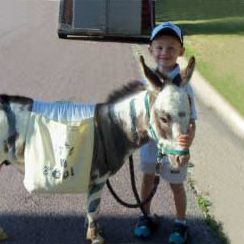Yes. A male donkey is called a "Jack". A female donkey is called a "Jenny".
Miniatue donkeys are anything under 36" (measured at shoulders/cross area), over 36" is a standard size donkey.
Actually a micro mini donkey is just a miniature donkey that is under 30" (measured at shoulders/cross area). They still should have the correct build and conformation as minis over 30", just smaller.
Actually this is a little upsetting to me. Dwarfism is a genitic disorder and should never be used for breeding. Not as common in mini donkeys as in miniature horses. Some people have seen this term on the internet, but what they are seeing are very healthy miniature donkey foals.
The colors range from pure white/blue eyed, to spotted, gray, red, brown, very dark brown, to black. The most common is the beautiful but typical gray with cross down shoulder and along center of back to tail base. See the "Legend of the Donkey Cross", the very touching story of how the donkey got its special cross.
Yes, donkeys normally form bonds with their herd, but it is not uncommon to see a special "friendship" among two or three donkeys in the herd. You will often see these donkeys together, grazing or playing. They are in the herd, but move together.
Donkeys are herd animals. They need to be with another donkey or multiple donkeys. You will have a very sad and unhappy donkey if you try to put them in without an equine buddy, specifically. They can do pretty well with a lone horse (another species which also should never be alone). The horse and donkey buddy up. But once again, we highly recommend that your donkey have another donkey buddy for them. They will be much more gentle, loving pets when there are two of them.
Yes, they make amazing pets.* They are affectionate, love people, and can be wonderful with children. As with all animals however, donkeys should be supervised with children. They make excellent therapy animals. Always take precautions with un-gelded males (jacks) as their hormones can make them less predictable than gelded jacks. Jennies and gelded jacks are the most gentle, which makes them the best "pets".
* Like horses, donkeys are equines, and thus herd animals. A donkey's willingness to accept a human as a member of its herd however, enables donkeys to form an attachment to people more than other equines usually do. This puts the donkey-human bond more on par with that of a companion animal, similar to the human-canine bond.
Once donkeys have formed a herd, introducing new donkeys to the group can occasionally cause some friction. Rest assured however that this can be worked through with a little time and care. Jennies can be a little snobbish and may take a little while to accept newcomers. I will often feed the new donkeys somewhat apart from the herd for a while, to ensure that they get their share of feed. If bringing in a new single donkey, I will try and pick a good friendship match from my existing herd and put these two together in their own area until they are buds and then turn them all back in together.
Minis can live up to 35 years, but their average lifespan is approximately 25 years.
Donkeys thrive on a good quality grass hay and/or pasture grass. They are pretty hardy little animals and do well on a lot of different types of hay. Some people give a small amount of sweet feed as a treat. They do like treats! They will not overeat or drink themselves to death however, like horses have been known to do. They will get heavy, so it is important to watch their food intake.
Regular wormings, yearly vaccines, and hoof care as needed. They are given horse vaccines, ask your vet on what they would recommend for your area. Horse wormers are given as appropriate for the weight of the individual animal. Donkeys only need a small pasture, two donkeys would never be able to keep an acre of land "mowed".
Jacks or male donkeys that are not used for breeding should be gelded. They make much calmer, safer, and happier pets. Jacks that are not gelded could get frustrated and take it out on their owners or other animals in the herd. Jennies or female donkeys are typically not spayed. As long as they are housed with other jennies or gelded jacks, harmony should exist.
They need a good shelter to keep them out of the wind, and they really don't like the rain or water. They are very hardy, and do well in cold climates. They get very wooly and fuzzy in the winter.
NO. They are too small to take on a predator. If that is what you are looking for, you need a standard or jackstock mammoth.
They do bray, and it is loud. Jacks do the most braying, especially when there are female donkeys nearby. Jennies will also bray, but not near as much as ungelded males.
They really are not stubborn, but they are very cautious. If they are unsure of what their feet are going to be touching, they will not step forward. They want to make sure that their feet will have a solid surface under them. This means that water, stepping into deep snow, or stepping on something that does not seem stable to them will make them stop until they feel that the way forward is safe.



